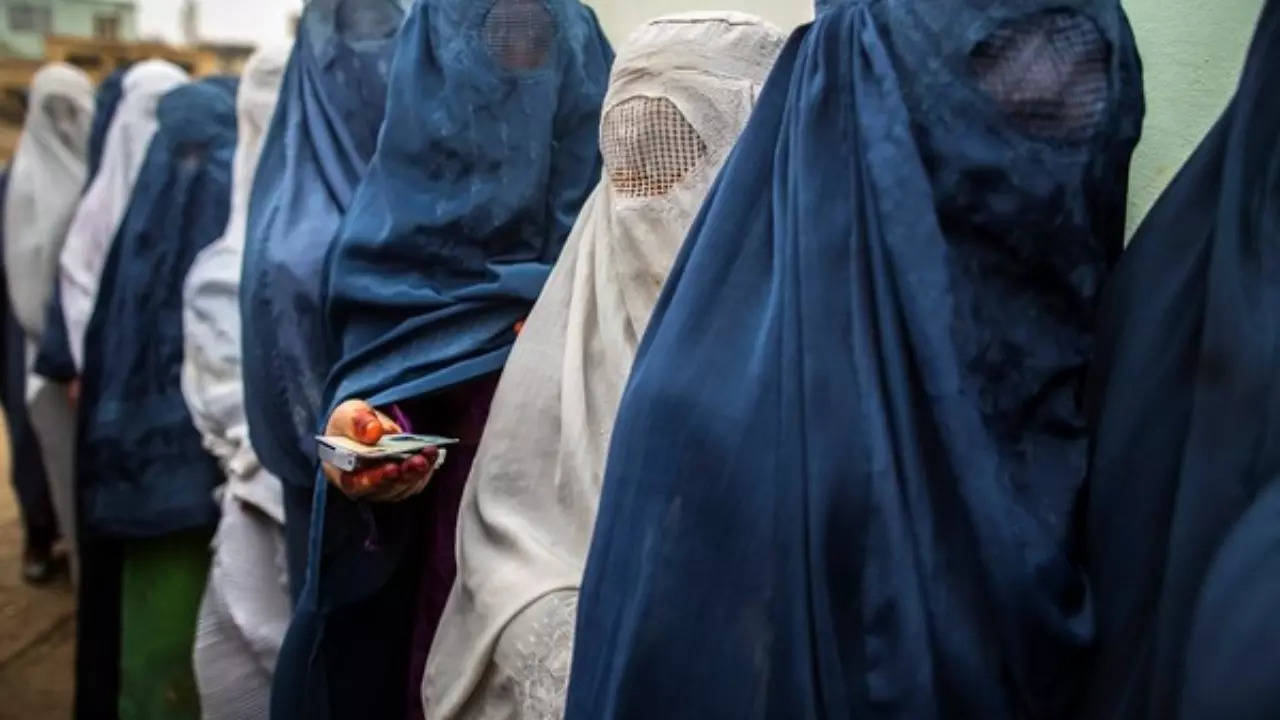KABUL: An Afghan woman sings in a video showing just a sliver of her face, one of dozens of women taking part in an online protest against a law that bans women from raising their voices in public.
Taliban authorities last week announced the law, which includes rules that women’s faces, bodies and voices should be “covered” outside the home, among 35 articles dictating behaviour and lifestyle.
In response, Afghan women inside and outside the country have posted videos on social media of them singing, along with hashtags such as “My voice is not forbidden” and “No to Taliban”.
In one video, reportedly shot inside Afghanistan, a woman is shown singing while dressed head to toe in black, with a long veil over her face.
“You have silenced my voice for the foreseeable future… you have imprisoned me in my home for the crime of being a woman,” she says.
Groups of women activists posted videos raising their fists or tearing photos of the Taliban supreme leader Hibatullah Akhundzada, who rules by decree from the southern city of Kandahar.
“A woman’s voice is the voice of justice,” an activist group chants in another video.
In another, X user Taiba Sulaimani sings as she adjusts her veil in a mirror.
“A woman’s voice is her identity, not something that should be hidden,” she says.
The morality law, known as the “Promotion of Virtue and Prevention of Vice”, formalises many rules already in place since the Taliban takeover in 2021.
It says women must not sing or recite aloud in public or let their voices carry beyond the walls of their homes.
“When an adult woman has to leave her home out of necessity, she is required to cover her face, body and voice,” it says.
The law refers to women’s voices as “aurat” — a term used in Islamic law, or sharia, to denote the intimate parts of a man or woman that must be covered.
Women and men cannot look at members of the opposite sex who are not close relatives and taxi drivers should not transport women travelling without male guardians, according to the law.
When the Taliban authorities swept to power they implemented a strict interpretation of Islamic law.
Chief Taliban government spokesman Zabihullah Mujahid has dismissed criticism of the law as “arrogance” and misunderstanding or disrespect of sharia.
Women have borne the brunt of restrictions introduced over the past three years that have restricted education as well as access to public spaces and many jobs that the United Nations has labelled “gender apartheid”.
The UN and other international bodies have condemned the new law, saying it further squeezes women’s rights.
On Tuesday, the UN High Commissioner for Human Rights called for the law to be repealed, calling it “utterly intolerable”.
The law “cements policies that completely erase women’s presence in public — silencing their voices, and depriving them of their individual autonomy, effectively attempting to render them into faceless, voiceless shadows”, said spokeswoman Ravina Shamdasani.
Taliban authorities last week announced the law, which includes rules that women’s faces, bodies and voices should be “covered” outside the home, among 35 articles dictating behaviour and lifestyle.
In response, Afghan women inside and outside the country have posted videos on social media of them singing, along with hashtags such as “My voice is not forbidden” and “No to Taliban”.
In one video, reportedly shot inside Afghanistan, a woman is shown singing while dressed head to toe in black, with a long veil over her face.
“You have silenced my voice for the foreseeable future… you have imprisoned me in my home for the crime of being a woman,” she says.
Groups of women activists posted videos raising their fists or tearing photos of the Taliban supreme leader Hibatullah Akhundzada, who rules by decree from the southern city of Kandahar.
“A woman’s voice is the voice of justice,” an activist group chants in another video.
In another, X user Taiba Sulaimani sings as she adjusts her veil in a mirror.
“A woman’s voice is her identity, not something that should be hidden,” she says.
The morality law, known as the “Promotion of Virtue and Prevention of Vice”, formalises many rules already in place since the Taliban takeover in 2021.
It says women must not sing or recite aloud in public or let their voices carry beyond the walls of their homes.
“When an adult woman has to leave her home out of necessity, she is required to cover her face, body and voice,” it says.
The law refers to women’s voices as “aurat” — a term used in Islamic law, or sharia, to denote the intimate parts of a man or woman that must be covered.
Women and men cannot look at members of the opposite sex who are not close relatives and taxi drivers should not transport women travelling without male guardians, according to the law.
When the Taliban authorities swept to power they implemented a strict interpretation of Islamic law.
Chief Taliban government spokesman Zabihullah Mujahid has dismissed criticism of the law as “arrogance” and misunderstanding or disrespect of sharia.
Women have borne the brunt of restrictions introduced over the past three years that have restricted education as well as access to public spaces and many jobs that the United Nations has labelled “gender apartheid”.
The UN and other international bodies have condemned the new law, saying it further squeezes women’s rights.
On Tuesday, the UN High Commissioner for Human Rights called for the law to be repealed, calling it “utterly intolerable”.
The law “cements policies that completely erase women’s presence in public — silencing their voices, and depriving them of their individual autonomy, effectively attempting to render them into faceless, voiceless shadows”, said spokeswoman Ravina Shamdasani.









![Best Weight Loss Supplements [2022-23] New Reports!](https://technologytangle.com/wp-content/uploads/2022/12/p1-1170962-1670840878.png)




